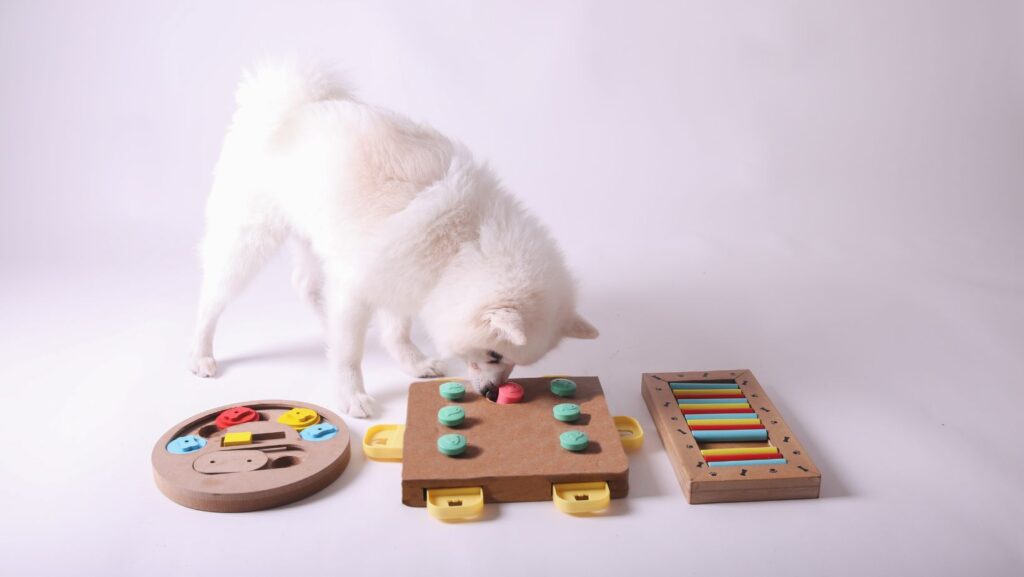Interactive games for dogs aren’t just fun and games; they’re crucial for a dog’s mental and physical health. Engaging a dog’s mind and body through play helps prevent boredom and related behavioral issues such as chewing or excessive barking. From puzzle toys to hide-and-seek, the variety of games available today can cater to all sorts of canine personalities and energy levels.
Interactive Games for Dogs
Interactive games play a crucial role in enhancing dogs’ overall well-being. They provide essential mental stimulation and have a significant impact on their physical health.
Mental Stimulation
 Interactive games engage a dog’s brain, challenging them to think and solve problems. Puzzles that involve hiding treats or toys demand that dogs figure out how to retrieve them. For instance, puzzle feeders require dogs to move sliders or lift compartments to find their food. Similarly, games like “hide and seek,” where owners hide and dogs must find them, boost dogs’ problem-solving skills and ability to follow instructions. These activities not only prevent boredom but also sharpen cognitive functions, making dogs more observant and mentally agile.
Interactive games engage a dog’s brain, challenging them to think and solve problems. Puzzles that involve hiding treats or toys demand that dogs figure out how to retrieve them. For instance, puzzle feeders require dogs to move sliders or lift compartments to find their food. Similarly, games like “hide and seek,” where owners hide and dogs must find them, boost dogs’ problem-solving skills and ability to follow instructions. These activities not only prevent boredom but also sharpen cognitive functions, making dogs more observant and mentally agile.
Physical Health Impact
 Regular interaction through games ensures that dogs remain physically active, which is vital for maintaining a healthy weight and strong cardiovascular system. Games like fetch, tug-of-war, and Frisbee involve running, jumping, and tugging actions that help improve muscle tone and stamina. These games also promote better coordination and agility, which are crucial for a dog’s physical development. For puppies especially, engaging in these active games helps in their growth process by improving bone health and muscle development, ensuring that they grow into strong, healthy adults.
Regular interaction through games ensures that dogs remain physically active, which is vital for maintaining a healthy weight and strong cardiovascular system. Games like fetch, tug-of-war, and Frisbee involve running, jumping, and tugging actions that help improve muscle tone and stamina. These games also promote better coordination and agility, which are crucial for a dog’s physical development. For puppies especially, engaging in these active games helps in their growth process by improving bone health and muscle development, ensuring that they grow into strong, healthy adults.
Types of Interactive Games for Dogs
Interactive games for dogs not only enhance their mental and physical wellbeing but also bond pets with their owners. Such games range from puzzle toys to interactive feeders and hide and seek activities.
Puzzle Toys
 Puzzle toys actively sharpen a dog’s problem-solving skills by challenging them with tasks that ultimately lead to a reward. These toys come in various forms, such as sliding blocks, spinners, or flip-open compartments. Dogs must use their paws or snouts to solve these puzzles to reveal hidden treats. Brands like Outward Hound and Kong offer a variety of puzzle toys that cater to different levels of difficulty, ensuring that all dogs, from beginners to more experienced ones, find a suitable challenge.
Puzzle toys actively sharpen a dog’s problem-solving skills by challenging them with tasks that ultimately lead to a reward. These toys come in various forms, such as sliding blocks, spinners, or flip-open compartments. Dogs must use their paws or snouts to solve these puzzles to reveal hidden treats. Brands like Outward Hound and Kong offer a variety of puzzle toys that cater to different levels of difficulty, ensuring that all dogs, from beginners to more experienced ones, find a suitable challenge.
Interactive Feeders
Interactive feeders transform meal times into an engaging activity, slowing down the eating process to aid digestion and prevent bloating. These feeders often feature maze-like designs that require dogs to navigate their kibble or treats from complex paths using their nose or tongue. This type of game not only prolongs feeding time but also reduces the risk of overeating. The Northmate Green Feeder and the Aikiou Bowl are examples of interactive feeders that make dogs work for their food, stimulating their mental and physical faculties.
Hide and Seek Toys
 Hide and seek toys stimulate a dog’s natural hunting instincts and provide both scent and retrieval challenges. These toys usually consist of plush animals hidden inside a larger item, like a toy box or a tree stump. Dogs must sniff out and remove the small toys from their hiding spots, which keeps them entertained and mentally engaged. Popular choices include the ZippyPaws Woodland Friends Burrow or the Outward Hound Hide A Squirrel Puzzle Toy. Each offers a unique way to challenge your pet, making playtime exciting and rewarding.
Hide and seek toys stimulate a dog’s natural hunting instincts and provide both scent and retrieval challenges. These toys usually consist of plush animals hidden inside a larger item, like a toy box or a tree stump. Dogs must sniff out and remove the small toys from their hiding spots, which keeps them entertained and mentally engaged. Popular choices include the ZippyPaws Woodland Friends Burrow or the Outward Hound Hide A Squirrel Puzzle Toy. Each offers a unique way to challenge your pet, making playtime exciting and rewarding.
DIY Interactive Games
Exploring interactive games for dogs not only promotes their well-being but also deepens the connection they share with their owners. By choosing the right game that aligns with a dog’s individual needs and characteristics owners can ensure that their furry friends are not only entertained but also receiving significant mental and physical stimulation. Whether opting for store-bought options from trusted brands or crafting homemade puzzles that challenge their pets dogs benefit immensely from this dynamic form of play. Engaging dogs in these activities regularly can lead to a happier healthier pet and a joyful more fulfilling relationship between dogs and their owners.

